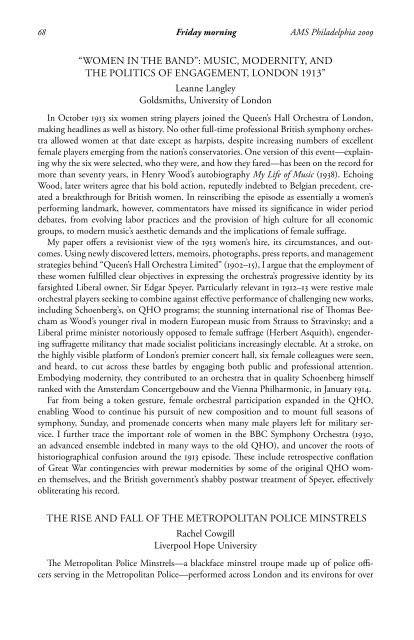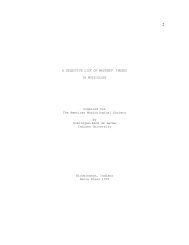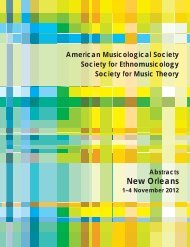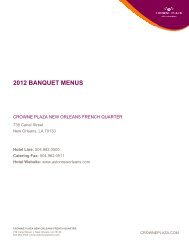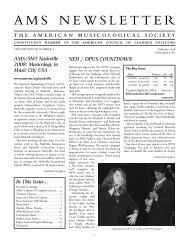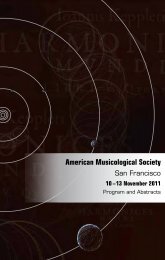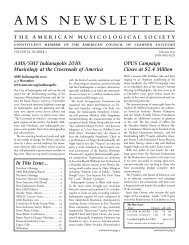AMS Philadelphia 2009 Abstracts - American Musicological Society
AMS Philadelphia 2009 Abstracts - American Musicological Society
AMS Philadelphia 2009 Abstracts - American Musicological Society
Create successful ePaper yourself
Turn your PDF publications into a flip-book with our unique Google optimized e-Paper software.
68 Friday morning <strong>AMS</strong> <strong>Philadelphia</strong> <strong>2009</strong><br />
“WOMEN IN THE BAND”: MUSIC, MODERNITY, AND<br />
THE POLITICS OF ENGAGEMENT, LONDON 1913”<br />
Leanne Langley<br />
Goldsmiths, University of London<br />
In October 1913 six women string players joined the Queen’s Hall Orchestra of London,<br />
making headlines as well as history. No other full-time professional British symphony orchestra<br />
allowed women at that date except as harpists, despite increasing numbers of excellent<br />
female players emerging from the nation’s conservatories. One version of this event—explaining<br />
why the six were selected, who they were, and how they fared—has been on the record for<br />
more than seventy years, in Henry Wood’s autobiography My Life of Music (1938). Echoing<br />
Wood, later writers agree that his bold action, reputedly indebted to Belgian precedent, created<br />
a breakthrough for British women. In reinscribing the episode as essentially a women’s<br />
performing landmark, however, commentators have missed its significance in wider period<br />
debates, from evolving labor practices and the provision of high culture for all economic<br />
groups, to modern music’s aesthetic demands and the implications of female suffrage.<br />
My paper offers a revisionist view of the 1913 women’s hire, its circumstances, and outcomes.<br />
Using newly discovered letters, memoirs, photographs, press reports, and management<br />
strategies behind “Queen’s Hall Orchestra Limited” (1902–15), I argue that the employment of<br />
these women fulfilled clear objectives in expressing the orchestra’s progressive identity by its<br />
farsighted Liberal owner, Sir Edgar Speyer. Particularly relevant in 1912–13 were restive male<br />
orchestral players seeking to combine against effective performance of challenging new works,<br />
including Schoenberg’s, on QHO programs; the stunning international rise of Thomas Beecham<br />
as Wood’s younger rival in modern European music from Strauss to Stravinsky; and a<br />
Liberal prime minister notoriously opposed to female suffrage (Herbert Asquith), engendering<br />
suffragette militancy that made socialist politicians increasingly electable. At a stroke, on<br />
the highly visible platform of London’s premier concert hall, six female colleagues were seen,<br />
and heard, to cut across these battles by engaging both public and professional attention.<br />
Embodying modernity, they contributed to an orchestra that in quality Schoenberg himself<br />
ranked with the Amsterdam Concertgebouw and the Vienna Philharmonic, in January 1914.<br />
Far from being a token gesture, female orchestral participation expanded in the QHO,<br />
enabling Wood to continue his pursuit of new composition and to mount full seasons of<br />
symphony, Sunday, and promenade concerts when many male players left for military service.<br />
I further trace the important role of women in the BBC Symphony Orchestra (1930,<br />
an advanced ensemble indebted in many ways to the old QHO), and uncover the roots of<br />
historiographical confusion around the 1913 episode. These include retrospective conflation<br />
of Great War contingencies with prewar modernities by some of the original QHO women<br />
themselves, and the British government’s shabby postwar treatment of Speyer, effectively<br />
obliterating his record.<br />
THE RISE AND FALL OF THE METROPOLITAN POLICE MINSTRELS<br />
Rachel Cowgill<br />
Liverpool Hope University<br />
The Metropolitan Police Minstrels—a blackface minstrel troupe made up of police officers<br />
serving in the Metropolitan Police—performed across London and its environs for over


